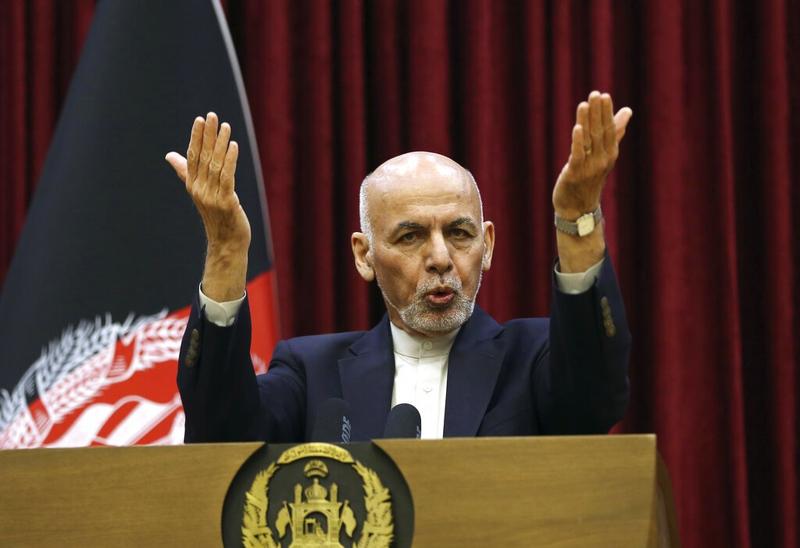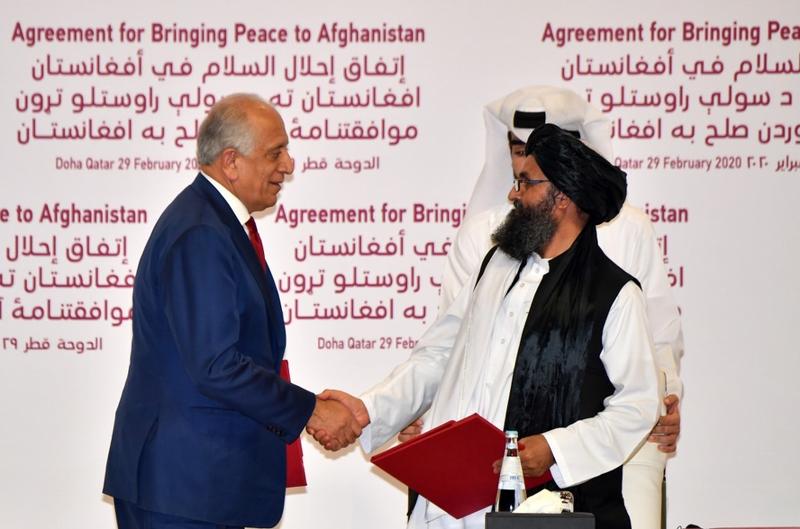 Afghan President Ashraf Ghani speaks during a news conference at the presidential palace in Kabul, Afghanistan, March, 1, 2020. Ghani said Sunday he won't be releasing the 5,000 prisoners the Taliban say must be freed before intra-Afghan negotiations can begin. (RAHMAT GUL / AP)
Afghan President Ashraf Ghani speaks during a news conference at the presidential palace in Kabul, Afghanistan, March, 1, 2020. Ghani said Sunday he won't be releasing the 5,000 prisoners the Taliban say must be freed before intra-Afghan negotiations can begin. (RAHMAT GUL / AP)
KABUL – Afghan President Mohammad Ashraf Ghani has refused the Taliban outfit's demand for the release of 5,000 detainees within 10 days, saying no precondition is acceptable for initiating intra-Afghan talks.
"No commitment has been made for the release of 5,000 prisoners. This could be included at the agenda of the talks with the Taliban and if anyone released should not take arm against the people of Afghanistan," Ghani told reporters at the Presidential Palace a day after the inking of a U.S.-Taliban peace deal at a ceremony held in Qatar's Doha on Saturday.
A Taliban senior representative at the group's liaison office in Doha, Sher Mohammad Abas Stanikzai said on Saturday that the "Kabul administration should release 5,000 inmates within 10 days" as a precondition for initiating intra-Afghan dialogue.
READ MORE: US, coalition forces to withdraw from Afghanistan in 14 months
"The release of the Taliban detainees is within the authority of the government of Afghanistan and not with the United States, and we have no agreement with America in this field," Ghani said.
The withdrawal of all the US-led coalition forces would take 14 months if the Taliban adhere to the agreement and avoid committing violence in Afghanistan
The Afghan president also noted that his government would spare no effort to ensure the restoration of lasting peace in Afghanistan and safeguard all the achievements and values including the rights of women achieved over the past 19 years.
Following rounds of talks between the United States and the Taliban, which lasted about 18 months, the two sides inked an agreement in Doha on Saturday that underlines the United States to reduce its forces to 8,600 from the current 13,000-strong force within 135 days of signing the deal.
The United States and its allies would proportionally reduce their military strength in Afghanistan if the Taliban comply with the agreement and reduce the violent to the level of ceasefire.
Afghan president also expressed hope that the so-called reduction in violence should turned into ceasefire across the country to pave the way for returning viable peace in Afghanistan.
The withdrawal of all the US-led coalition forces would take 14 months if the Taliban adhere to the agreement and avoid committing violence in the country, both the US Secretary of Defense Mark Esper and NATO Secretary General Jens Stoltenberg told at a joint press conference with president Ghani here on Saturday.
Taliban start diplomatic outreach
The Taliban’s political chief has met with senior diplomats from countries including Russia, Indonesia and Norway, hours after signing a deal with Washington aimed at ending the Afghan war, the hardline Islamist group said in a statement on Sunday.
ALSO READ: Afghan president says progress reported in US-Taliban talks
Saturday’s accord was signed in the Qatari capital Doha by US special envoy Zalmay Khalilzad and Taliban political chief Mullah Abdul Ghani Baradar, with US Secretary of State Mike Pompeo on hand to witness the ceremony.
 (Left to right) US Special Representative for Afghanistan Reconciliation Zalmay Khalilzad and Taliban co-founder Mullah Abdul Ghani Baradar shake hands after signing a peace agreement during a ceremony in the Qatari capital Doha, Feb 29. (GIUSEPPE CACACE / AFP)
(Left to right) US Special Representative for Afghanistan Reconciliation Zalmay Khalilzad and Taliban co-founder Mullah Abdul Ghani Baradar shake hands after signing a peace agreement during a ceremony in the Qatari capital Doha, Feb 29. (GIUSEPPE CACACE / AFP)
Soon after the agreement, US President Donald Trump said he would be personally meeting leaders of the Taliban in the near future and rejected criticism surrounding the deal signed with the Islamist insurgents.
Baradar met foreign ministers from Turkey, Uzbekistan and Norway in Doha along with diplomats from Russia, Indonesia and neighbouring nations, the Taliban said, a move that signaled the group’s determination to secure international legitimacy.
“The dignitaries who met Mullah Baradar expressed their commitments towards Afghanistan’s reconstruction and development... the US-Taliban agreement is historical,” said Taliban spokesman Zabiullah Mujahid.
“Baradar received congratulatory messages and thanked them (ministers and diplomats) for attending the ceremony,” he said.
*With inputs from Reuters


